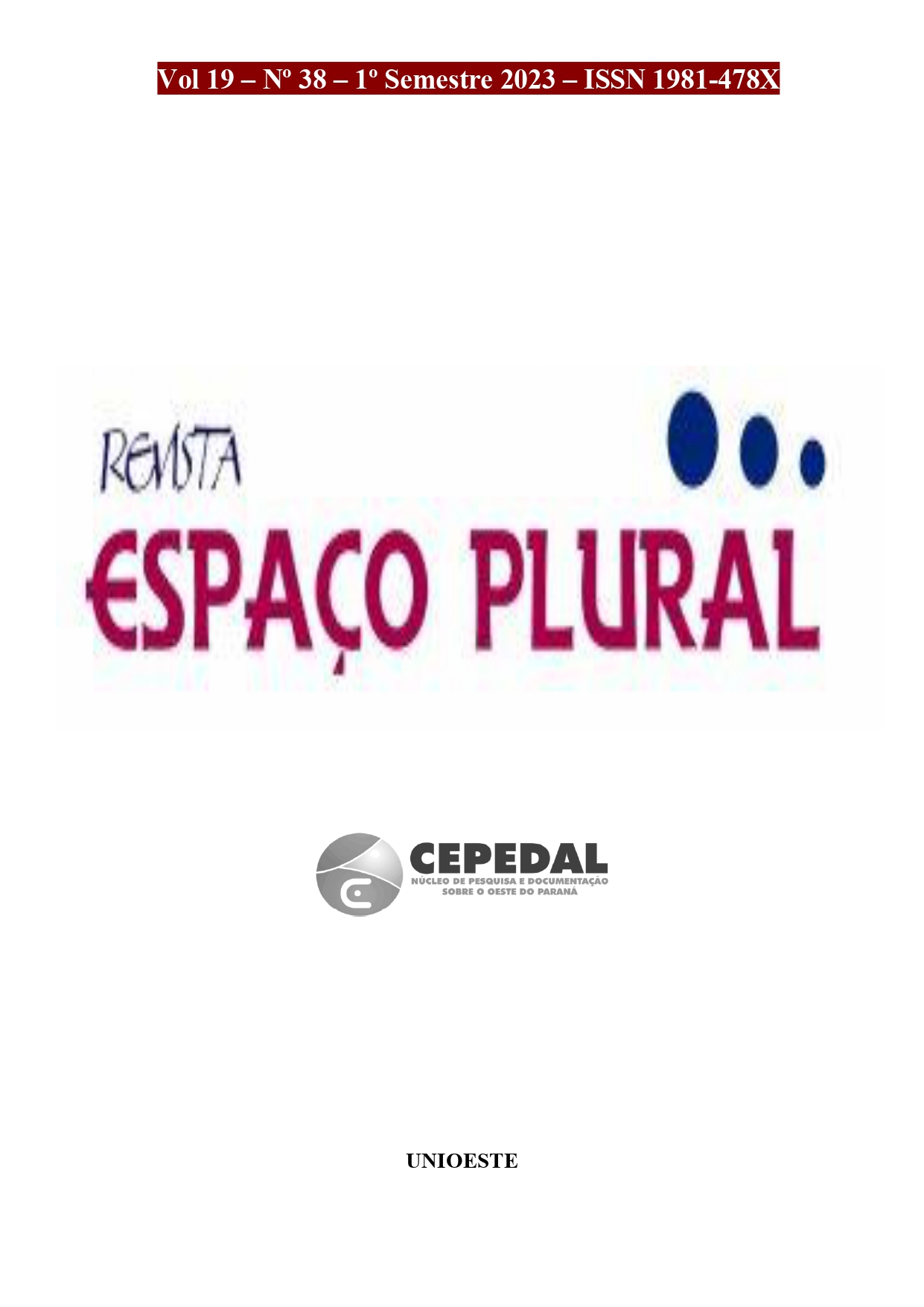A relação do nazismo com crenças ocultistas e a sua transformação em mito após a Segunda Guerra Mundial
Resumo
Persiste na atualidade uma ideia, estimulada por certo gênero sensacionalista de literatura (principalmente teóricos da conspiração), de que os nazistas e o seu líder, Adolf Hitler, eram inspirados por agentes ocultos e das trevas que operavam na Alemanha e em toda a Europa antes mesmo de seu advento ao poder na década de 1930. Este fato resultou em grande fascínio pós-guerra no que diz respeito a uma suposta ligação com, por exemplo, crenças ocultistas, saberes esotéricos e com seres de outro mundo. Para observador iniciante o nacional-socialismo frequentemente é tido como um misterioso interlúdio da história. Mas, até que ponto as ideias ocultistas e esotéricas influenciaram, de fato, o pensamento de Hitler e dos nazistas? Para responder essa questão, objetivou-se analisar as características das ideologias nacionalistas e das crenças ocultistas formadas no final do século XIX e início do XX, que enraizaram na sociedade alemã ideias racistas e míticas (superioridade da raça ariana) “preparando o terreno” para a formação ideológica do partido Nacional-Socialista. Além disso, buscou-se compreender como essas questões influenciaram no processo de transformação do nazismo em mito após o término da Segunda Guerra Mundial, por escritores ocultistas e por teóricos conspiratórios.
Referências
ANSART, Pierre. A gestão das paixões políticas. Curitiba: Editora UFPR, 2019.
ATHAIDES, Rafael. O fascismo genérico e o Integralismo: uma análise da Ação Integralista Brasileira à luz de recentes teorias do fascismo. In: Diálogos (Maringá. Online), v. 18, n.3, p. 1305-1333, set.-dez./2014.
BAKER, Alan. Invisible Eagle: The history of Nazi occultism. United Kingdom: Virgin Books, 2000.
BARBOSA DA SILVA, José. História invisível: uma análise psicossocial das raízes mágico-religiosas do Nacional-Socialismo. Tese (Doutorado em Psicologia), Universidade de São Paulo, 2009.
BARKUN, Michael. A culture of Conspiracy: Apocalyptic Visions in Contemporary America. London: University of California Press, 2003.
BERGIER, Jacques; PAUWELS, Louis. O despertar dos mágicos: introdução ao realismo fantástico. São Paulo: Difusão Europeia do Livro, 1971.
BERTONHA, J.F. Nazismo, ocultismo e conspirações. História Unisinos, 2007, vol 11, nº 3, 381-384.
BREPOHL DE MAGALHÃES, Marion. Imaginação literária e política: os alemães e o imperialismo 1880/1945. Uberlândia: EDUFU, 2010. p. 109.
BREPOHL DE MAGALHÃES, Marion. Pangermanismo e nazismo: a trajetória alemã rumo ao Brasil. Curitiba: Samp, 2014.
BULWER-LYTTON, Edward. The Coming Race. London: Hesperus Press, 2008.
FEST, Joachim. Hitler. Rio de Janeiro: Nova Fronteira, 1976.
GIRARDET, Raoul. Mitos e mitologias políticas. São Paulo: Companhia das Letras, 1987.
GOODRICK-CLARKE, Nicholas. Sol negro: cultos arianos, nazismo esotérico e políticas de identidade. São Paulo: Madras, 2004.
GRIFFIN, Roger; FELDMANN, Mathew (Orgs.). Fascism: Critical Concepts in Political Science. vol 1. Londres: Routledge, 2004.
GUTERMAN, Marcos. A moral nazista: Uma análise do processo que transformou crime em virtude na Alemanha de Hitler. Tese (Doutorado) – Faculdade de Filosofia, Letras e Ciências Humanas, Universidade de São Paulo. São Paulo. 2013.
HITLER, Adolf. Minha Luta. São Paulo: Centauro, 2001.
KERSHAW, Ian. Hitler. São Paulo: Companhia das Letras, 2010.
KINGSEPP, Eva. Hitler as Our Devil? Nazi Germany in Mainstream Media. In: BUTTSWORTH, Sara; ABBENHUIS, Maartje. Monsters in the Mirror: Representations of Nazism in Post-War Popular Culture. Santa Bárbara, Califórnia: Praeger, 2010.
KURLANDER, Eric. Hitler’s Monster: a supernatural history of the Third Reich. New Haven: Yale University Press, 2017.
LIEBENFELS, Jorn. Ostara (revista), 89 números. Áustria: Rodaun y Mödling, 1905-1917.
LUKACS, John. O Hitler da História. Rio de Janeiro: Jorge Zahar Editor, 1998.
LUZ, Tiago. Nazismo e misticismo alemão no início do século XX. Monografia (História), Universidade Federal do Paraná, Curitiba, 2013.
RAUSCHNING, Hermann. Hitler Speaks. Londres: Thornton Butterworth, 1939.
RÜSEN, J. Razão histórica: teoria da história - os fundamentos da ciência histórica. Brasília: UNB, 2001.
SEBOTTENDORF, Rudolf. Bevor Hitler kam. Universidade Northwestern: Faksmile-Verlag/Versand, 1982.
Downloads
Publicado
Como Citar
Edição
Seção
Licença
Copyright (c) 2023 Espaço Plural

Este trabalho está licenciado sob uma licença Creative Commons Attribution-NonCommercial-ShareAlike 4.0 International License.
Aviso de Direito Autoral Creative Commons
Política para Periódicos de Acesso Livre
Autores que publicam nesta revista concordam com os seguintes termos:
1. Autores mantém os direitos autorais e concedem à revista o direito de primeira publicação, com o trabalho simultaneamente licenciado sob a Licença Creative Commons Attribution que permite o compartilhamento do trabalho com reconhecimento da autoria e publicação inicial nesta revista.2. Autores têm autorização para assumir contratos adicionais separadamente, para distribuição não-exclusiva da versão do trabalho publicada nesta revista (ex.: publicar em repositório institucional ou como capítulo de livro), com reconhecimento de autoria e publicação inicial nesta revista.
3. Autores têm permissão e são estimulados a publicar e distribuir seu trabalho online (ex.: em repositórios institucionais ou na sua página pessoal) a qualquer ponto antes ou durante o processo editorial, já que isso pode gerar alterações produtivas, bem como aumentar o impacto e a citação do trabalho publicado (Veja O Efeito do Acesso Livre).
Licença Creative Commons
Esta obra está licenciada com uma Licença Creative Commons Atribuição-NãoComercial-CompartilhaIgual 4.0 Internacional, o que permite compartilhar, copiar, distribuir, exibir, reproduzir, a totalidade ou partes desde que não tenha objetivo comercial e sejam citados os autores e a fonte.


